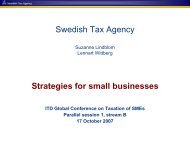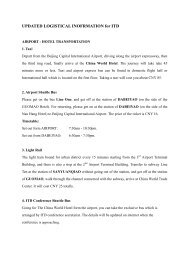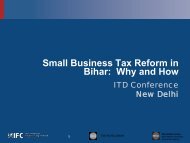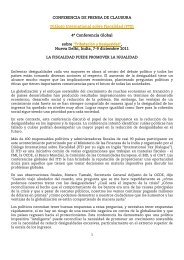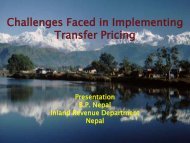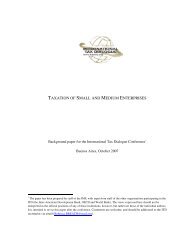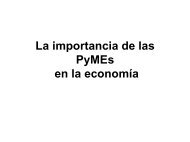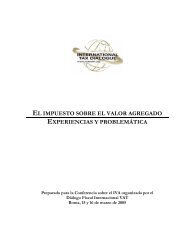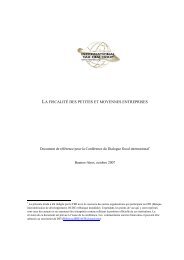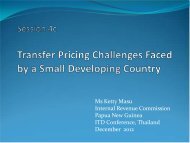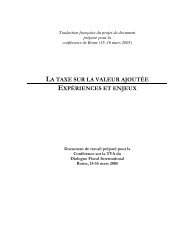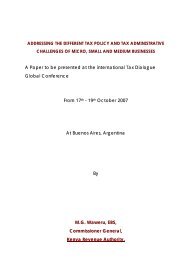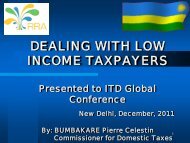Arcotia Hatsidimitris - International Tax Dialogue
Arcotia Hatsidimitris - International Tax Dialogue
Arcotia Hatsidimitris - International Tax Dialogue
You also want an ePaper? Increase the reach of your titles
YUMPU automatically turns print PDFs into web optimized ePapers that Google loves.
8. TRANSFER PRICING AND DEVELOPING COUNTRIES – 75<br />
users, combined with filing fees and penalties for late filing could cover some, or possibly all, of<br />
the running costs.<br />
• To access the data the tax authority simply needs to visit the relevant website and so needs no<br />
special technology beyond a connection to the Internet.<br />
Over time this approach would give tax administrations access to a wide range of reported results in<br />
the corporate sector in their own country and in others. Costs should be low and offset by improvements in<br />
compliance that would result. The feasibility of this solution could be explored further as part of any joint<br />
work between the FTA and the Task Force on <strong>Tax</strong> and Development.<br />
Chapter 1 of this study recognised that a large proportion of international business transactions take<br />
place within multi-national groups and can involve very complex structures. Often developing countries<br />
see only one small part of the multi-national enterprise – as the experience of the African administration<br />
described above illustrates and it is very rare for the commercial centre of the whole multi-national<br />
business to be based in their country. These difficulties can sometimes be overcome by the developing<br />
country’s tax administration having a good working relationship with a subsidiary or branch of a multinational<br />
enterprise, and sometimes with the principal company, in line with the principles in the FTA’s<br />
Study into the Role of <strong>Tax</strong> Intermediaries 3 . This should be supplemented by the active use of exchange of<br />
information provisions in bilateral and multilateral agreements. The Multilateral Convention on Mutual<br />
Administrative Assistance in <strong>Tax</strong> Matters is the most comprehensive multilateral instrument available in<br />
the tax field. It is broad in scope and as well as assisting countries in the field of transfer pricing, can be<br />
used for fighting tax evasion and other law enforcement purposes, such as fighting corruption and money<br />
laundering.<br />
Where that is not the case, a developing country will need an effective regime for obtaining<br />
information available within the country, viable sanctions for failure to maintain or obtain key<br />
documentation, and an ability to tax a realistic estimate of the full profit where there is no co-operation.<br />
Some multi-national enterprises have already shown a genuine willingness to help developing countries<br />
devise effective transfer pricing regimes and that is to be welcomed. A project under the Task Force on tax<br />
and development, delivered by the OECD, World Bank and EU with the support of ATAF, has put in place<br />
a bilateral assistance programme with particular countries which engages both business and civil society<br />
along with government to ensure that the transfer pricing rules are effective, enforceable and not overly<br />
burdensome. Another initiative to take place within the next twelve months involves a global multinational<br />
enterprise, a major firm of tax advisors and a developed country tax administration coming<br />
together to work with an African tax administration to address the issues in Box 20 above.<br />
Settling transfer pricing disputes<br />
Transfer pricing audits and enquiries can often involve significant amounts of tax and generally there<br />
is no single right answer. As a result most transfer pricing disputes need to be settled through negotiation<br />
with the tax administration and the MNE making compromises. As we have seen, this uncertainty makes it<br />
critical to have strong governance processes in place within the tax administration to address both issues of<br />
propriety and consistency in decision making.<br />
In most transfer pricing cases acceptable outcomes are usually achieved through negotiation. But tax<br />
administrations in developing countries can lack experience of concluding cases in this way. Concerns<br />
about corruption mean that they have reservations about trusting too much in auditor or inspector<br />
discretion. More experienced tax administrations can help in this context by sharing their skills and their<br />
approaches to governance (see Chapter 4 above) and the FTA is committed to working with ATAF to<br />
DEALING EFFECTIVELY WITH THE CHALLENGES OF TRANSFER PRICING © OECD 2012



